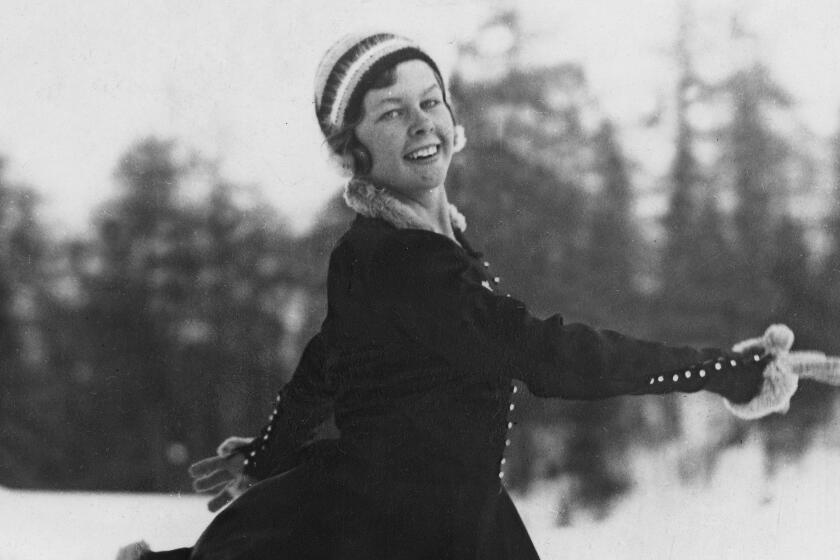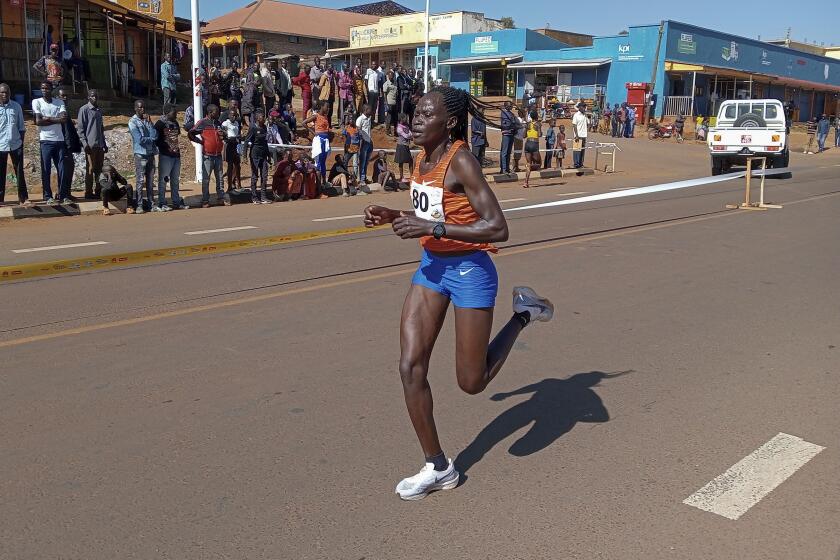U.S. OLYMPIC FESTIVAL / LOS ANGELES 1991 : Opening Ceremony Plays on Past in Hopes of Igniting the Present
For at least one night, U.S. Olympic Festival organizers tried to put their financial woes on hold and celebrate the beginning of the largest multi-day, multi-sport competition in Los Angeles since the 1984 Summer Games with an impressive opening ceremony at Dodger Stadium.
Befitting the smaller scale of the event, one which involves more than 3,000 athletes in 36 sports over 10 days, the ceremony was not as grand or extravagant as the one for the Olympics seven summers ago at the Coliseum. With the crowd reported at 29,500, neither was it as well attended as organizers had hoped.
But it was colorful, featuring 1,000 choir members, 1,000 dancers, 700 musicians, three sky-divers and fireworks in a 2 1/2-hour program produced by Radio City Music Hall.
There were other reminders of 1984, including the official opening declaration--”Let the Games begin”--by Ronald Reagan, who, as President, performed the same function for the Summer Olympics.
The games will have competition in 15 sports today.
A 27-day, 1,700-mile torch run through the state culminated with heavyweight boxing champion Evander Holyfield, who competed in the 1983 Festival in Colorado Springs, Colo., running one lap around Dodger Stadium before handing the torch to two California athletes, rhythmic gymnast Lily Chiang of Walnut Creek and judo player Mike Swain of Santa Clara, who ignited the flame in the caldron.
Elizabeth Primrose-Smith, the local organizing committee’s executive director, said that she hopes the Festival will “re-ignite the Olympic flame” in Los Angeles.
References to the 1984 Summer Games were appropriate because U.S. Olympic Committee President Robert Helmick said earlier Friday that the Festival was brought to Los Angeles by the USOC as a reward for the city’s contribution to the Olympic movement.
“It’s been seven years since we were here in 1984, when the Olympic movement for (years) before the opening ceremony almost came to an end on several occasions,” he said, referring specifically to the financial problems in 1976 at Montreal and the U.S.-led boycott in 1980 at Moscow.
“But as a result of the success in Los Angeles . . . the Olympic Games are again in good shape and we are able to independently finance them. I would like to thank Los Angeles.”
Helmick’s tribute to the city’s glorious Olympic past diverted the focus at least temporarily from the uncertain future of the Festival over the next nine days.
He confirmed that the local organizing committee’s financial problems were so serious as recently as January that the USOC considered moving the Festival to another city.
The only time the USOC has taken such action before was in 1983, when Los Angeles Olympic Organizing Committee officials said that they did not want to be responsible for another multi-sport event one year before the Summer Games. The Festival was moved that summer to Colorado Springs.
“We received a report that there could be some problems tied to holding the Festival in such a large city,” Helmick said of findings submitted last December to the USOC by its Olympic Festival committee.
“But we made the decision that there would be a Los Angeles Festival and committed to making this a success for the organizing committee. We think you’ll see over the next few days that our efforts will produce results.”
USOC officials emphasized that the difficulties this year should not reflect upon the organizing committee, which has recruited more corporate sponsors and raised more money than any of the organizers for the past 10 Festivals.
The problem is that the local organizing committee also has a record $15-million budget, which Don Porter, chairman of the USOC’s Festival committee, attributed to the “the high cost of doing business in Los Angeles.”
Primrose-Smith expressed optimism Friday that the Festival will generate $3.4 million in ticket revenues, which the organizing committee needs to break even.
In response to a question at a news conference about the progress of ticket sales, she said: “I can’t give you a figure, but I don’t think you’re going to see empty seats all over the place.”
Primrose-Smith clarified a report in Friday’s Times about a $1-million, short-term, no-interest loan the organizing committee acquired to bridge the gap between bills that are due and anticipated revenues. She said that $600,000 came from the Amateur Athletic Foundation, $300,000 from the USOC and $100,000 from ARCO.
Helmick said that the USOC loaned the money “to ensure that no one closed down a venue” but added that it was not an unprecedented gesture. He cited the $800,000 that 1987 Pan American Games organizers at Indianapolis borrowed. The USOC, he said, eventually forgave about $300,000 of that debt.
The Festival has lost money in other cities, but there has been particular concern about this one because of the competition for the entertainment dollar in Los Angeles. USOC spokesman Mike Moran pointed out Friday that the Festival has been held in other major markets, including Houston and Minneapolis-St. Paul, but said: “This is the first time it’s been in an astronomically sized market.”
USOC officials have expressed disappointment that, unlike other Festival sites, Los Angeles has not greeted the event with considerable fanfare. Harry Usher, chairman of the organizing committee’s board of directors, said that the city government’s policy of spending no public funds on events such as this one, including the 1984 Summer Olympics, extended to banners and flags.
“I’d like to have more money so that we could have banners around and things like that, all those things you can do when you’re running the Olympics,” said Usher, who was second in command to Peter Ueberroth with the LAOOC.
“It would be wonderful if the city had pumped this event. But there’s no city of L.A. money involved, and that’s the game we have to play here.”
More to Read
Go beyond the scoreboard
Get the latest on L.A.'s teams in the daily Sports Report newsletter.
You may occasionally receive promotional content from the Los Angeles Times.







